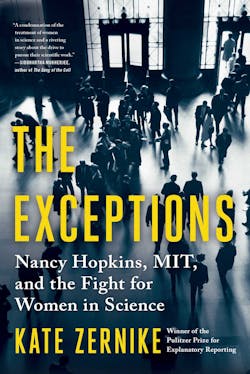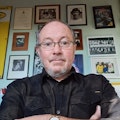"The Exceptions — Nancy Hopkins, MIT, and the Fight for Women in Science" by Kate Zernike
How much did you know about this book before picking it up?
I read a review of it in Nature (note that you don’t need to be a subscriber to read Nature’s book reviews).
What surprised you the most about the book?
That female scientists at MIT consistently blamed themselves for the wholescale discrimination meted out to them and had to put up with being tolerated rather than embraced by their often less well qualified male counterparts.
Once Nancy Hopkins (latterly the Amgen Inc. Professor of Biology at MIT and now working on advocacy for cancer prevention and early detection research) set about investigating this discrimination with scientific rigor, she first found that male MIT scientists had more lab space than their female counterparts. Working with the (few) other tenured women scientists at MIT she also found that they were paid less, had access to fewer resources and routinely missed out on promotions.
It took until 1999 for MIT to admit that it was discriminating against its most senior female scientists.
How thought-provoking did you find the book?
As you turn the pages, your anger and frustration mount because so many talented scientists never had the opportunity to achieve (or even begin to achieve) their potential.
Did the book change your opinion about anything, or did you learn something new from it? If so, what?
At the end it’s tempting to say that it all happened a long time ago now and things are much better in 2023. But are they really? So, I went on a hunt to find research about how women working in STEM subjects are treated today. This led me to the career column in the June 26, 2023, issue of Nature "Don’t get mad, get equal: putting an end to misogyny in science."
Here two senior female academics outline how subtle forms of misogyny are used to attack female leadership and coerce women to conform to conventional gender norms.
It left me wondering if I should have taken the two quotes at the start of the book far more to heart:
“The thought could not be avoided that the best place for a feminist was in another person’s lab.” Nobel Prize winner James D. Watson, writing in his bestselling 1968 book The Double Helix.
And
“As for women, God help them.” Nobel Prize winner Barbara McClintock, in a September 21, 1976, letter to Nancy Hopkins.
Rate this book on a scale of 1 to 10, with 10 being the highest.
10
Why did you give the book the rating you did?
Because I’ll re-read it, hopefully with slightly lower blood pressure!
About the Author
Seán Ottewell
Editor-at-Large
Seán Crevan Ottewell is Chemical Processing's Editor-at-Large. Seán earned his bachelor's of science degree in biochemistry at the University of Warwick and his master's in radiation biochemistry at the University of London. He served as Science Officer with the UK Department of Environment’s Chernobyl Monitoring Unit’s Food Science Radiation Unit, London. His editorial background includes assistant editor, news editor and then editor of The Chemical Engineer, the Institution of Chemical Engineers’ twice monthly technical journal. Prior to joining Chemical Processing in 2012 he was editor of European Chemical Engineer, European Process Engineer, International Power Engineer, and European Laboratory Scientist, with Setform Limited, London.
He is based in East Mayo, Republic of Ireland, where he and his wife Suzi (a maths, biology and chemistry teacher) host guests from all over the world at their holiday cottage in East Mayo.


